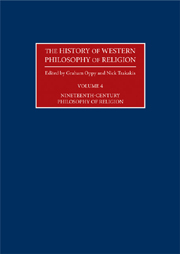Book contents
- Frontmatter
- Contents
- Editorial Introduction
- Contributors
- 1 Nineteenth-Century Philosophy of Religion: An Introduction
- 2 Johann Gottlieb Fichte
- 3 Friedrich Schleiermacher
- 4 G. W. F. Hegel
- 5 Friedrich Schelling
- 6 Arthur Schopenhauer
- 7 Auguste Comte
- 8 John Henry Newman
- 9 Ralph Waldo Emerson
- 10 Ludwig Feuerbach
- 11 John Stuart Mill
- 12 Charles Darwin
- 13 Søren Kierkegaard
- 14 Karl Marx and Friedrich Engels
- 15 Wilhelm Dilthey
- 16 Edward Caird
- 17 Charles S. Peirce
- 18 Friedrich Nietzsche
- 19 Josiah Royce
- 20 Sigmund Freud
- 21 Émile Durkheim
- Chronology
- Bibliography
- Index
21 - Émile Durkheim
- Frontmatter
- Contents
- Editorial Introduction
- Contributors
- 1 Nineteenth-Century Philosophy of Religion: An Introduction
- 2 Johann Gottlieb Fichte
- 3 Friedrich Schleiermacher
- 4 G. W. F. Hegel
- 5 Friedrich Schelling
- 6 Arthur Schopenhauer
- 7 Auguste Comte
- 8 John Henry Newman
- 9 Ralph Waldo Emerson
- 10 Ludwig Feuerbach
- 11 John Stuart Mill
- 12 Charles Darwin
- 13 Søren Kierkegaard
- 14 Karl Marx and Friedrich Engels
- 15 Wilhelm Dilthey
- 16 Edward Caird
- 17 Charles S. Peirce
- 18 Friedrich Nietzsche
- 19 Josiah Royce
- 20 Sigmund Freud
- 21 Émile Durkheim
- Chronology
- Bibliography
- Index
Summary
Émile Durkheim (1858–1917) is, along with Max Weber, unquestionably one of the two most important ‘founding figures’ of sociology, as well as a major influence on contemporary sociologies of religion, culture and society. Outside sociology, however, he also had a huge impact on anthropology, social psychology and criminology, as well as various branches of philosophy. Born in Épinal, France, he grew up in the Jewish community of Alsace-Lorraine and, coming from a long line of rabbis, initially seemed destined for the rabbinate, although he soon determined to abandon the family tradition. Following studies at the College d'Épinal, he was admitted to the École Normale Supérieure in Paris in 1879, studying philosophy and history (Lukes 1973: 39–43). It was here that his interest in the social implications and applications of philosophical thought started to emerge and, after a period as a philosophy teacher at a lycèe, this interest started to take a distinctively social scientific form following his first academic appointment at Bordeaux University (1887). Employed to teach social science and pedagogy, the philosophy of education, in 1895 he was given a chair in social science. This period at Bordeaux also saw the publication of his books The Division of Labor in Society ([1893] 1984), The Rules of Sociological Method ([1895] 1982) and Suicide: A Study in Sociology ([1897] 1952), as well as the establishment of the new, immensely influential, periodical L'Année Sociologique, through which Durkheim gathered together a new generation of scholars working within a sociological tradition of his own design (Poggi 2000: 3).
- Type
- Chapter
- Information
- The History of Western Philosophy of Religion , pp. 287 - 298Publisher: Acumen PublishingPrint publication year: 2009

